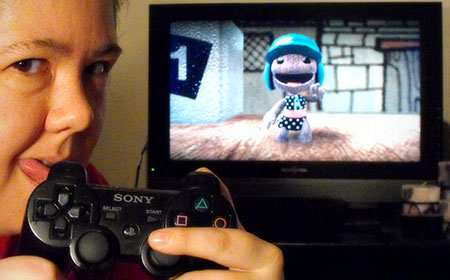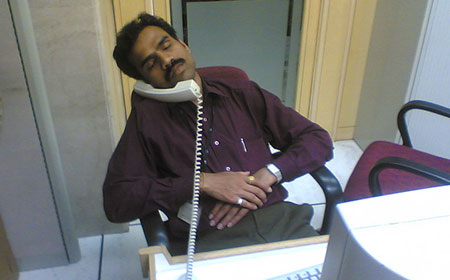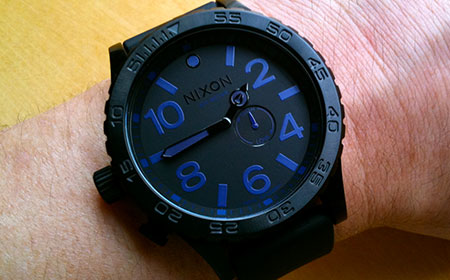Here's a fun little article from Onlinecollege.org with some good reminders about how behaving badly can negatively impact your career. Enjoy!
13 Habits That May Be Sabotaging Your Career
http://www.onlinecollege.org/2012/07/18/13-habits-that-may-be-sabotaging-your-career/
July 18, 2012
Everyone has bad habits. Smoking, driving too fast, overeating, giving in to stress; no matter what the habit is, we all know that we need to break them, if only we could find the motivation. How’s this for motivation? Some of your bad habits may actually be sabotaging your career. Whether it’s office gossip or playing around on Facebook, it’s time to kick these bad habits to the curb. Read on, and discover which bad work habits may be getting in the way of your next promotion.
-

If you answer “How was your day?” questions with gossip or complaints about your co-workers or clients, it’s a bad sign. Gossip isn’t productive for work, and it can really make you look like a negative person.
-

Before you point out why someone else is making your life so difficult, take the time to consider what you might have done better. Chances are, it’s not all their fault, or any at all. Remember that you can’t control what others do, only how you deal with those actions. Step up to the plate and be more proactive and responsible for your own work life.
-

It’s tempting to turn things in “just a little late,” but doing so is career sabotage. Your boss and colleagues learn that they can’t count on you, and it’s frustrating for others that are waiting on you. Show that you respect their time by meeting deadlines regularly and communicating clearly and early on the rare occasions when you can’t.
-

This one goes hand in hand with blowing off deadlines. Push things to the side too often, and of course, you’ll be late. But not only that, you’ll look bad. No one is impressed by your big show of getting it all done at the last minute. They’d be much more impressed if you carefully planned your time and productivity to get things done on time or even early.
-

You might assume that working 24/7 will help you get ahead, but so often, the opposite is true. It’s important to unchain from work, taking regular breaks to become more productive. You’ll be able to come back with a fresh outlook and do a better job.
-

Sure, just about everyone has Facebook, but that doesn’t mean you have to connect at work. Kill the bad habit of checking your favorite sites before settling in for work. You’re wasting precious time, and if your coworkers see what you’re doing, you’re putting off a bad impression. Avoid getting sidetracked; just focus on work during work time.
-

Your coworkers like to be informed, not left in the dark. You don’t need to inundate them with email updates, but be sure that if they’re waiting on you for something, they know what the status is. Forget to do this, and you’ll come off as disorganized and undependable.
-

A sloppy appearance can really affect you at work. Dressing poorly or not keeping up with your hygiene sends a message that you don’t take your job seriously. Take a look around and see what your coworkers are wearing. Maintain a level of dress that matches or exceed what everyone else is doing so that you can put off a professional appearance.
-

Whether you’re shy or busy, or just can’t be bothered, keeping a low profile is just not a good idea. Being an unknown in your organization gets you nowhere, where making connections and allowing your work to be recognized can open you up to opportunities. Get out from behind your desk, interacting with others, volunteering for new projects, and spending more time being visible at work.
-

No one likes a prima donna at work. Workers who refuse to step out of their job description or keep iron-clad hours even in the busiest of seasons don’t win any favor. Sure, it’s important to keep yourself from being overwhelmed, but you’ve got to be a team player, too. Be careful not to let anyone hear you say, “That’s not in my job description.” Instead, be willing to pitch in when needed.
-

Email is so prevalent these days, most people send messages without a second thought. But if you’re not proofreading, you’re really doing yourself a disservice. Stick to professional email etiquette, take your time to make sure your message is correct (and being sent to the right recipients), and project a professional email image.
-

Punctuality is key to professionalism. No one likes a late worker, and if you’re late to meetings, it’s really rude. Being late projects a message that you think your time is more valuable than others’ (it’s not). Lateness makes you look like an unreliable, inconsiderate person. Plan ahead, and do your best to be punctual on a regular basis. If you know you’re not going to make it on time, be sure to let others know, and apologize when you get there.
-

Work for a company long enough, and things are bound to change. Sure, you may be set in your ways, but if you resist progress at work, you just might get left behind. Whining about new processes, technology, and developments makes you sound like a curmudgeon. Be a team player and get on board with progress at work.
Tags:
professional,
career,
change,
hygiene,
gossip,
habits,
appearance,
deadlines,
communication
How can you continue to be a strong candidate for employment even when you’ve been out of work for a long time? New York Times columnist Eileen Zimmerman interviewed several employment consultants and experts to give us some great ideas. Here’s a summary of her main points, or check out the full article here:
of work for a long time? New York Times columnist Eileen Zimmerman interviewed several employment consultants and experts to give us some great ideas. Here’s a summary of her main points, or check out the full article here:
1) Keep current with what’s happening in your industry.
2) Maintain professional certifications, credentials and licenses and involve yourself
in activities that use your professional skills.
-
Take temporary or part-time work in your industry if possible, or do unpaid volunteer work for nonprofits or charitable organizations to make sure you to stay up-to-date professionally.
-
Consider starting your own consulting firm and landing at least a few jobs (large or small) that you can add to your resume and discuss during interviews.
3) Don’t try to hide gaps on your resume, but do emphasize the positive.
-
While reorganizing your resume in an attempt to hide gaps won’t fool anyone, some tactics will help to accentuate the positive. For example, using a “Skills Summary” to lead off the resume rather than “Experience” may reduce visual focus on date gaps.
-
Change the header “Work Experience” to “Experience” so it is easier to include volunteer work as well as paid gigs (clarifying which is which) on your resume.
-
Quantify results and show how you contributed to the growth and success of an organization, regardless of whether the work was volunteer or paid.
4) Be straightforward about the loss of previous employment.
-
When interviewing, be ready to share the story of your job loss, regardless of whether your previous position wasn’t a good fit anymore, or if it was a layoff. Frame the situation in the best light possible without being dishonest. Remember that fudging the truth and getting caught would not bode well for you.
5) Be specific about the position you are applying for during an interview.
-
To avoid looking like someone who doesn’t know what they want, be clear about what position you are seeking. According to Elena Bajic, founder and C.E.O. of Ivy Exec, a recruitment service in New York, if you were a marketing manager, for example, rather than saying you want to work in any marketing capacity, it’s better to be more specific. Employers don’t want to hire someone into a job that’s not a good fit and have them leave as soon as something more appropriate comes along. Ms. Bajic says employers aren’t looking for just any match, “They are looking for the right one.”
Good luck with your job-hunt and keep the faith!
You can access the original NYT’s article here.
Tags:
professional,
success,
results,
skills,
New York Times,
Eileen Zimmerman,
volunteer work,
up-to-date,
interviews,
job-hunt,
resume,
industry associations,
credentials,
part-time work,
nonprofits,
jobs,
Skills Summary,
gaps,
employers,
candidate,
unemployment,
long-term,
certifications,
Experience,
Tips,
recruitment
 Early in my career, one of my bosses said, “Remember Catherine, the people you work with are not your friends.” The irony of that is that she and I have been close friends for almost 20 years now! And, although you can and will make great friendships at work, I have come to better understand the wisdom of her words over the years.
Early in my career, one of my bosses said, “Remember Catherine, the people you work with are not your friends.” The irony of that is that she and I have been close friends for almost 20 years now! And, although you can and will make great friendships at work, I have come to better understand the wisdom of her words over the years.
As we all know, much of our life is spent at work. So, if we can’t be friendly with our coworkers, life could get pretty dull. Not only that, but getting things done at work often requires teamwork. So, how to relate with coworkers on a personal basis takes some thought. After all, at work, others judge your performance. You are paid to support the organization and its success, not to build a network of friends. Luckily, one often can do both. From your employer’s perspective, you are being assessed on your ability to improve results and get along with others. So how can you enjoy friendships and still maintain a professional demeanor?
Remember, at work, its business first. While you want to enjoy your coworkers, each of you has a work agenda and you may not always agree. Often, it’s not a problem when you and your coworker’s agendas match up, but inevitably, your agenda will be at cross-purposes with someone else’s at the workplace. It may not always be fair or fun, but in life, that’s how it goes.
So, here are some tips for navigating the world of workplace friendships. (I’ve included some ideas from a blog post by career expert Heather R. Huhman on Glassdoor.com since her article inspired me to write on this topic. Check it out!)
-
Strive to work well with others: Treat people with respect, negotiate in good faith, deliver on your promises and avoid surprises. In short, act with integrity. It engenders trust. Feel free to share some laughs, but don’t forget why you are at work. This is business and today’s ally may be tomorrow’s competitor.
-
Remain appropriate and professional. Be mindful of what you share about your personal life with your co-workers. There is a reason that the expression “TMI”, (aka “too much information”) was invented. Are you sharing something about yourself that a coworker really needs to know? Will it make their day or their workweek better and/or improve your working relationship? If not, you may want to keep it to yourself.
-
Get your work done and do it well. Remember why you were hired. You have deadlines for a reason, so don’t get distracted and spend all your productive hours socializing.
-
Watch your language. Don’t gossip and speak badly about other workers. Keep conversations positive to help boost workplace morale. This guideline may also limit your downside when and if your coworker is not as resistant to spreading gossip as you are.
-
Set boundaries in direct reporting relationships. A friendship with your boss or your subordinate can be warm and fun, as long as it is respectful and appropriate. Remember, at some point, you will have either to receive or give a performance evaluation. Don’t set yourself up for an uncomfortable situation.
-
Be a good communicator. Many conflicts arise because of poor communication. We all want to believe we will never be involved in a workplace conflict, but that’s not realistic. When conflicts arise, handle them maturely. Focus on issues and behaviors and don’t get personal. Use effective communication tools and do your best to work things out. Consider the long-term results of any disagreement. You probably don’t want to ruin a friendship, a good working relationship or get yourself fired.
-
Have lunch together. Having lunch with coworkers allows you time to be more personal without compromising productivity. From time to time, dinner may also be appropriate; however, I believe that any after hour meeting are optional. Use your best judgment as to how much time you want to spend with coworkers outside of the office - that time is yours.
To read the Heather R. Huhman’s blogpost that inspired and contributed to this discussion, check it out on Glassdoor.com at http://www.glassdoor.com/blog/guide-workplace-friendships/#disqus_thread
Good luck and may you enjoy a hassle free and friendly work environment.
Tags:
professional,
network,
career,
success,
results,
teamwork,
performance,
Glassdoor.com,
good faith,
laughs,
ally,
direct reporting,
good communicator,
conflict,
personal,
friendly,
problem,
competitor,
boundaries,
how to,
friendships,
respect,
integrity,
hired,
productive,
gossip,
boss,
work well with others,
trust,
friends at work,
wisdom,
coworkers,
Heather R. Huhman,
negotiate,
TMI,
language,
morale,
subordinate,
evaluation,
agenda
Looking for a new job is a project – and it can be a stre ssful one, especially if you’re currently unemployed. To make it better, I suggest you treat your job search as if it were a part-time job. Being organized and getting dressed everyday – as well as taking time for lunch and getting exercise, can help relieve stress. My experience is that a healthy, less stressed job seeker is usually more effective and more energetic - and that often translates into better results.
ssful one, especially if you’re currently unemployed. To make it better, I suggest you treat your job search as if it were a part-time job. Being organized and getting dressed everyday – as well as taking time for lunch and getting exercise, can help relieve stress. My experience is that a healthy, less stressed job seeker is usually more effective and more energetic - and that often translates into better results.
Here are some tips and guidelines to consider when putting your project plan in place:
- Set a goal for daily and weekly hours for working on your job search. If possible, set regular office hours for yourself.
- Don’t overdo it. Forty hours a week may be too taxing. Considering starting with 20 to 25 hours a week and adjust as needed.
- Create an organized, professional workspace for yourself. Sitting in front of the TV with a bowl of cereal in your hand and a notepad on your lap may not be the best strategy for clear thinking.
- Make yourself presentable. You’re valuable. Treat yourself as such. You don’t have to dress-up in business clothes, but looking good contributes to a positive outlook.
- Each week, set goals and create a project plan for what you want to accomplish during your office hours. Here are some activities to consider:
- Spend time on your personal brand if you are making a career shift or change. Take time to take career surveys, do informational interviews and develop a clear awareness of what you want from your next position.
- Network in-person, on the phone and online. Online networking is important, but don’t overlook high touch contact.
- Develop new contacts by joining groups and attending industry-networking functions.
- Follow companies and apply for positions using targeted online job sites. There are many to consider, so pick the ones that suit you.
- Update your resume and cover letters as needed.
- Volunteer or take classes that improve or increase your marketable skills.
Last but not least, make time outside of your project schedule to connect with friends and share a few laughs. Because looking for a job is a job, you will benefit by taking time to recharge your batteries.
Best wishes for a happy, healthy and successful hunt. By the way, what job search tips have worked well for you?
Tags:
professional,
network,
results,
change,
goal,
skills,
part-time job,
relieve stress,
valuable,
career shift,
exercise,
how to,
resume,
benefit,
successful,
unemployed,
project plan,
marketable,
job sites,
recharge,
cover letters job search tips,
happy,
project,
stressful,
job search,
online networking,
industry














 of work for a long time? New York Times columnist Eileen Zimmerman interviewed several employment consultants and experts to give us some great ideas. Here’s a summary of her main points, or check out the full article
of work for a long time? New York Times columnist Eileen Zimmerman interviewed several employment consultants and experts to give us some great ideas. Here’s a summary of her main points, or check out the full article  Early in my career, one of my bosses said, “Remember Catherine, the people you work with are not your friends.” The irony of that is that she and I have been close friends for almost 20 years now! And, although you can and will make great friendships at work, I have come to better understand the wisdom of her words over the years.
Early in my career, one of my bosses said, “Remember Catherine, the people you work with are not your friends.” The irony of that is that she and I have been close friends for almost 20 years now! And, although you can and will make great friendships at work, I have come to better understand the wisdom of her words over the years. ssful one, especially if you’re currently unemployed. To make it better, I suggest you treat your job search as if it were a part-time job. Being organized and getting dressed everyday – as well as taking time for lunch and getting exercise, can help relieve stress. My experience is that a healthy, less stressed job seeker is usually more effective and more energetic - and that often translates into better results.
ssful one, especially if you’re currently unemployed. To make it better, I suggest you treat your job search as if it were a part-time job. Being organized and getting dressed everyday – as well as taking time for lunch and getting exercise, can help relieve stress. My experience is that a healthy, less stressed job seeker is usually more effective and more energetic - and that often translates into better results.